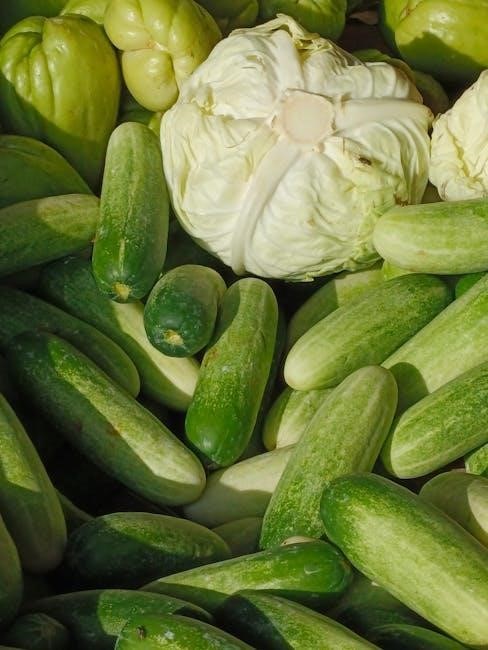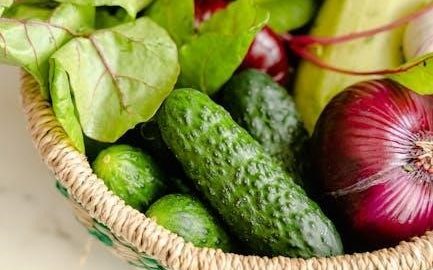Plant-based foods are a diverse and nutrient-rich category, including fruits, vegetables, whole grains, nuts, seeds, legumes, and fermented products․ They form the foundation of a healthy, sustainable diet․
What Are Plant-Based Foods?
Plant-based foods are minimally processed, nutrient-rich options derived from plants, including fruits, vegetables, whole grains, legumes, nuts, seeds, and fermented products like tempeh and kimchi․ They exclude animal-derived ingredients, emphasizing whole, natural sources․ These foods are foundational to a healthy, sustainable diet, offering essential vitamins, minerals, and fiber while promoting digestive health and environmental sustainability․ They cater to various dietary needs, including vegan, gluten-free, and low-FODMAP plans, making them versatile and accessible for diverse lifestyles․
Importance of Plant-Based Foods for Health and Environment
Plant-based foods are essential for promoting overall well-being and environmental sustainability․ They reduce the risk of chronic diseases, improve digestion, and lower cholesterol․ Environmentally, they minimize greenhouse gas emissions and support sustainable agriculture․ By choosing plant-based options, individuals contribute to healthier ecosystems and reduced resource depletion․ These foods also foster gut health through fiber and bioactive compounds, making them a cornerstone of a balanced and eco-conscious lifestyle that benefits both personal health and planetary well-being․

Comprehensive List of Plant-Based Foods
A plant-based diet includes a variety of whole, minimally processed foods such as fruits, vegetables, whole grains, legumes, nuts, seeds, and fermented products like tempeh and sauerkraut․ These foods provide essential nutrients, fiber, and antioxidants, supporting overall health and sustainability․ They are versatile and can be incorporated into meals in numerous ways, offering a rich and diverse culinary experience while promoting environmental and personal well-being․
Fruits, Vegetables, and Whole Grains
Fruits, vegetables, and whole grains are foundational to a plant-based diet, offering vibrant flavors and essential nutrients․ Fruits like berries, bananas, and apples provide vitamins and antioxidants, while vegetables such as leafy greens and cruciferous varieties supply fiber and minerals․ Whole grains, including quinoa, brown rice, oats, and whole wheat, are rich in complex carbohydrates and B vitamins․ These foods are versatile, supporting digestive health and energy levels, making them ideal for meals, snacks, and long-term wellness․ Incorporating them ensures a balanced and nutritious diet․
Legumes, Nuts, and Seeds
Legumes, nuts, and seeds are protein-rich staples in plant-based diets, providing essential nutrients and versatility․ Legumes like lentils, chickpeas, and black beans are high in protein and fiber, while nuts such as almonds and walnuts offer healthy fats and vitamins․ Seeds, including chia, flax, and hemp, are rich in omega-3s and antioxidants․ These foods are ideal for snacks, salads, and main dishes, offering sustained energy and supporting heart health․ They are also sustainable, making them a key component of eco-conscious diets․ Incorporating them enhances both nutrition and culinary variety․
Plant-Based Proteins and Dairy Alternatives
Plant-based proteins and dairy alternatives are versatile options for those avoiding animal products․ Tofu, tempeh, seitan, and edamame provide high-quality protein, while lentils and chickpeas are excellent in dishes like curries and salads․ Dairy alternatives such as almond milk, soy milk, oat milk, and cashew yogurt cater to diverse preferences and dietary needs․ Vegan cheeses made from nuts and seeds offer a dairy-free alternative, making plant-based diets accessible and enjoyable for everyone․ These options are rich in nutrients and support a balanced lifestyle․ Incorporating them ensures variety and nutrition in meals․
Healthy Snacks and Desserts
Plant-based snacks and desserts offer delicious and nutritious options․ Fresh fruits like berries, apples, and bananas provide natural sweetness․ Nuts, seeds, and trail mixes are convenient and packed with healthy fats․ Dark chocolate with high cocoa content is a treat rich in antioxidants․ Desserts like chia pudding, fruit smoothies, and baked goods made with whole grains satisfy cravings guilt-free․ These choices promote balanced eating without compromising taste, making them ideal for maintaining a healthy and enjoyable plant-based lifestyle․ They are perfect for satisfying sweet tooth and midday hunger․

Nutritional Benefits of Plant-Based Foods
Plant-based foods are rich in vitamins, minerals, antioxidants, and fiber, promoting overall health and well-being by supporting immune function, digestion, and disease prevention naturally․
Vitamins and Minerals in Plant-Based Foods
Plant-based foods are abundant in essential vitamins and minerals, such as vitamin C from citrus fruits, vitamin K in leafy greens, and calcium in fortified dairy alternatives․ Legumes provide iron, while nuts and seeds are rich in magnesium and zinc․ Whole grains like quinoa and brown rice offer B vitamins and selenium․ These nutrients support immune function, energy production, and overall health, making plant-based diets a nutrient-dense choice for balanced nutrition․
Antioxidants and Phytochemicals
Plant-based foods are rich in antioxidants and phytochemicals, such as polyphenols in berries, carotenoids in carrots, and flavonoids in dark chocolate․ These compounds help protect cells from oxidative damage, reducing inflammation and the risk of chronic diseases like heart disease and cancer․ Fermented foods, like kimchi and sauerkraut, also contain bioactive compounds that support gut health and immune function․ Incorporating a variety of colorful plant-based foods ensures a high intake of these beneficial nutrients, promoting long-term well-being and vitality․
Fiber and Digestive Health
Plant-based foods are abundant in dietary fiber, essential for optimal digestive health․ High-fiber foods like whole grains, vegetables, and legumes promote gut-friendly bacteria, boosting digestion and preventing constipation․ Fermented foods, such as kimchi and sauerkraut, enhance gut health by providing probiotics․ A diet rich in fiber also supports healthy blood sugar levels and cholesterol management․ Incorporating chia seeds, flaxseeds, and other fiber-rich options ensures a balanced intake, fostering a thriving digestive system and overall well-being through diverse plant-based choices․

Meal Planning and Recipes
Plant-based meals offer versatile, nutrient-rich options, from hearty breakfast bowls to dynamic dinners․ Explore diverse recipes using whole grains, legumes, and vibrant vegetables for balanced, flavorful dishes․
Breakfast Ideas
Start your day with nutritious plant-based breakfasts like oatmeal topped with fruits and nuts, chia pudding, or whole-grain toast with avocado․ Smoothies made with spinach, berries, and banana are quick and packed with vitamins․ Tofu scrambles with sautéed vegetables offer a protein-rich option, while quinoa bowls provide a hearty, fiber-filled start․ Incorporate superfoods like flaxseeds or hemp hearts for added nutrition․ These ideas ensure a balanced and energizing morning meal that’s both delicious and sustainable․
Lunch and Dinner Options
Plant-based lunches and dinners offer vibrant, flavorful choices․ Salads with quinoa, chickpeas, and mixed vegetables are nutritious and filling․ Lentil or vegetable stir-fries, paired with brown rice or whole-grain noodles, provide hearty meals․ Grilled tofu or tempeh with roasted vegetables adds protein and texture․ Stuffed bell peppers with beans and spices are another delicious option․ These meals are rich in fiber, vitamins, and minerals, making them both satisfying and beneficial for overall health and sustainability․
Snacks and Smoothies
Plant-based snacks and smoothies are perfect for quick, nutrient-packed options․ Fresh fruits, nuts, and energy balls made with oats and seeds are ideal snacks․ Smoothies can blend berries, bananas, spinach, and plant-based milk for a refreshing drink․ Veggie sticks with hummus or guacamole offer a crunchy, satisfying snack․ These options are rich in vitamins, minerals, and fiber, providing energy and supporting overall health while being easy to prepare and enjoy on the go․

Plant-Based Foods for Specific Dietary Needs
Plant-based foods cater to various dietary needs, including gluten-free, low-FODMAP, and weight management․ They offer tailored options for individuals with specific requirements, ensuring balanced nutrition and flexibility․
Gluten-Free Plant-Based Foods
A gluten-free, plant-based diet offers a variety of options, including quinoa, brown rice, lentils, and gluten-free grains like millet and amaranth․ Fresh fruits, vegetables, nuts, and seeds are naturally gluten-free and rich in nutrients․ Legumes, such as chickpeas and black beans, provide protein and fiber․ Fermented foods like gluten-free kimchi and non-dairy yogurt support gut health․ With careful planning, a gluten-free plant-based diet can be diverse, nutritious, and satisfying, ensuring all dietary needs are met without compromising flavor or variety․
Low-FODMAP Plant-Based Foods
Low-FODMAP plant-based foods are ideal for managing digestive sensitivity․ Options include bananas, berries, bell peppers, zucchini, carrots, and green beans․ Dark leafy greens like spinach and kale are also suitable․ For grains, gluten-free oats and rice are safe choices․ Protein sources like tofu and lentils can be included in moderation․ Avoid high-FODMAP foods like garlic, onions, and certain legumes․ Using almond flour for baking and opting for lactose-free plant-based milks helps maintain a balanced diet while managing FODMAP intake effectively․
Plant-Based Foods for Weight Management
Plant-based foods are excellent for weight management due to their high nutrient density and low calorie content․ Incorporate leafy greens like spinach and broccoli, which are filling yet low in calories․ Citrus fruits and berries provide natural sweetness without excess sugar․ Legumes such as lentils and chickpeas offer protein and fiber, keeping you satisfied․ Nuts and seeds are great for healthy fats but should be consumed in moderation․ Opt for whole grains like quinoa and brown rice for sustained energy․ Plant-based proteins like tofu and tempeh are lean alternatives to meat, aiding in weight control while maintaining muscle mass․ Balancing these foods in meals supports a healthy weight and overall well-being․
Adopting plant-based foods promotes health and environmental sustainability․ Explore diverse options in the list of plant-based foods PDF for a balanced and nutritious healthy lifestyle․
Final Thoughts on Adopting a Plant-Based Diet
Embracing a plant-based diet is a transformative choice for health and the planet․ It offers a wealth of benefits, including improved nutrition, reduced environmental impact, and increased food variety․ By incorporating a variety of whole, minimally processed foods such as fruits, vegetables, legumes, and whole grains, individuals can create balanced and satisfying meals․ Resources like a list of plant-based foods PDF can serve as a helpful guide, providing inspiration and structure for those transitioning to this lifestyle․ With its focus on natural ingredients and diverse flavors, a plant-based diet is both nourishing and sustainable, making it an excellent choice for long-term well-being․
Resources for Further Exploration
For those interested in exploring plant-based diets further, numerous resources are available․ Downloadable guides like the Whole Food Plant-Based Diet Grocery List PDF offer practical shopping tips․ Websites such as EatPlant-Based․com provide meal plans and recipes․ Additionally, books and online courses delve into nutrition and cooking techniques․ Social media platforms and forums also connect like-minded individuals, fostering a supportive community․ These resources empower individuals to make informed decisions and seamlessly transition to a plant-based lifestyle with confidence and creativity․
